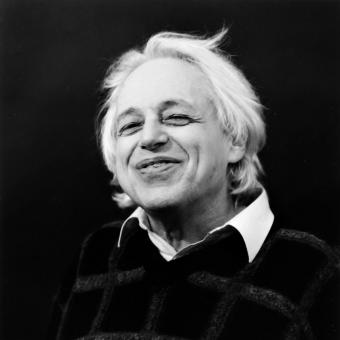Concert Hall ATM
- Concert
Portrait of GYORGY LIGETI
June 20 (Sun.),2010

Photo:H.J.Kropp/Schott Promotion
For Our Future, Listen to the Music of Gyorgy Ligeti, So That We May Continue to Have Hope
"Through my encounters with various cultures and people, I learned to accept different cultures and people as they are ? that is, to respect their differences as is. The idea that one country is superior to the rest, or that a culture can be inferior to others, is completely wrong. (*)" -- Gyorgy Sandor LIGETI
Born to a Hungarian Jewish family, Gyorgy Ligeti experienced oppression twice in the first half of his life. The first was the Nazi persecution of the Jews during the occupation of Hungary by the German Army in the Second World War. His father, brother and many relatives were all sent to concentration camps, and were killed there. The second was the crackdown under the socialist system that spread to Hungary in the postwar period, and which extended even to free thought and artistic creation. Thereafter, he pledged to work for the creation of a free and equal society where mankind could not repeat such foolish, horrendous acts. Still, with the 21st century upon us, mankind once again seems bound to descend into a morass of killing, with everyone loudly insisting upon his own rights.
That is precisely why it impels us to listen again to Ligeti's music, given his experience as a victim of the previous century, which led to his heartfelt aspiration for a mankind that transcended national boundaries and ethnic differences.
A reflection of the lineage of Ligeti's creative work gives us a good look at the totality of the history of composition in the postwar period. He approached all the different composition techniques that emerged after the war with a sensitive sensibility and intellectuality, producing thereby a series of works characterized by their uniqueness.
Ligeti's music has been accepted by a broad swath of people for the reason that it is completely removed from the "authoritative" strand of contemporary music that has been complicated by elitism and separated from the masses. His music evokes a rich imagination, and is replete with the unmistakable beauty of sound.
About the Pieces on the Program:
String Quartet No. 1, "Metamorphoses nocturnes," is an early work of Ligeti's that was influenced by Bela Bartok (1881-1945), considered to be one of Hungary's great anti-fascist heroes during the Second World War.
"Self-Portrait with Reich and Riley (with Chopin in the Background)" is a unique work for two
pianos written by Ligeti in tribute to the American standard-bearers of the minimal music movement, Steve Reich (b. 1936) and Terry Riley (b. 1935), and bears the name of the trailblazer Frederic Chopin (1810-49).
His Etudes pour piano, regarded as one of the greatest masterpieces of his latter life, is a work that requires an advanced level of virtuosity on the part of the pianist, pushing back and breaking through the boundaries of piano music.
Ligeti's "Unaccompanied Viola Sonata," which also requires an unmatched level of technique in its performance, contains elements taken from folksongs from Romania and elsewhere. He composed it focusing on natural overtones, evoking feelings of primordial sounds that still beat at the heart of folk music.
His String Quartet No. 2 is a piece written using the technique of micropolyphony. Just like the paintings of Paul Cezanne (1839-1906), who replaced clear outlines with pointillist effects, Ligeti employs a composition technique that leaves out specific melodies and outlines.
Last on the program is "Lux Aeterna," an unaccompanied piece for a chorus of 16 mixed voices. The title of the work ? which was even heard in Stanley Kubrick's movie, "2001: A Space Odyssey" (1968), during the moon-bus scene ?, refers to the Catholic sacrament for the dead.
*Excerpted from "Toru Takemitsu Dialogue Series #10 Gyorgy Ligeti," from "Polyphone Vol. 10," published by TBS Britannica
Person in charge: Akira Nakamura (chief producer, Concert Hall ATM)
Outline
Venue
Concert Hall ATM
Dates
June 20 (Sun.),2010
Ticket Information
Price
【All seats reserved】¥3,500 Student¥1,000
Pre-performance 1:15-
start 2:30 p.m. / open 3:00 p.m.
Contact
TEL TEL 029-227-8118
Concert Hall ATM Production Section
【Organized by】
Mito Arts Foundation
